Business facilities
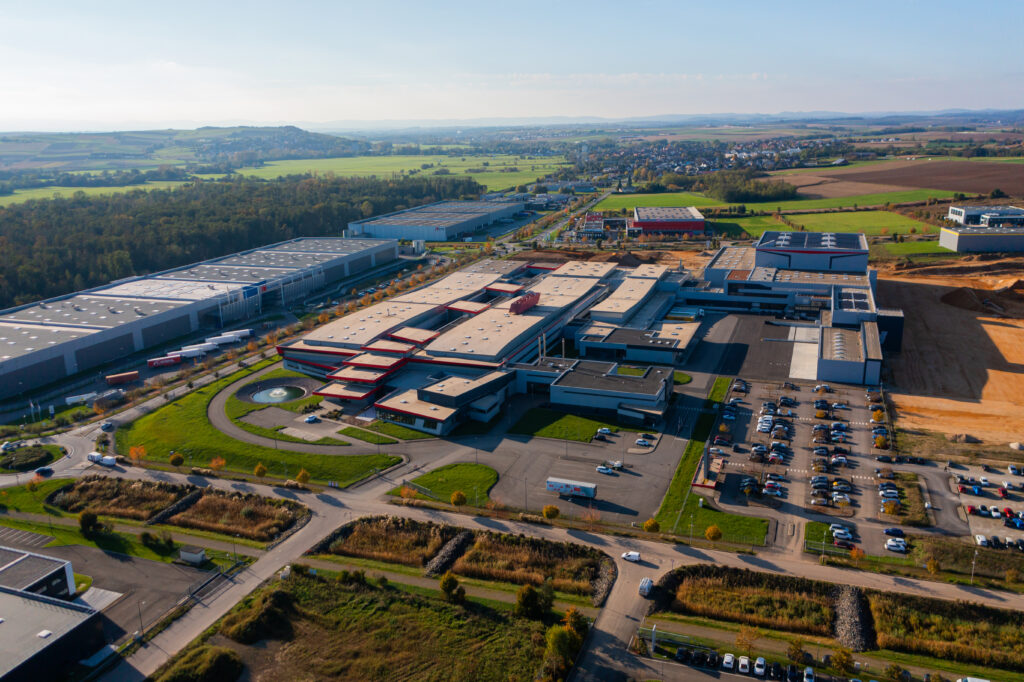
Alsace provides a diverse array of facilities for businesses across various sizes and sectors. The region’s rich industrial history has led to an abundance of land, specialized buildings, and transport infrastructure, which has been further enriched by the expansion of the digital sector.
Below are some of the key economic infrastructures in the region. This list is not exhaustive; for a more detailed overview of Alsace’s offerings and to explore available opportunities, please contact one of our economic development experts.
Specialized business facilities
WEurope (Industrial chemistry)
Weurope is an industrial and economic platform located in southern Alsace, focused on the chemical sector. It offers new businesses access to land, equipment, utilities, and expertise, as well as supplies of raw materials and processes.
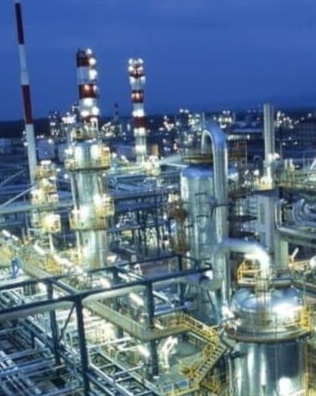
The Chalampé Industrial Platform provides international connectivity through a multimodal transport network:
- connection to French and German rail networks,
- proximity to the Port of Mulhouse-Rhin, which links to the Grand Canal of Alsace, serving German, Swiss, and Dutch platforms,
- access to French, German, and Swiss highways,
- close to Bâle-Mulhouse Airport and Mulhouse train station.
Nextmed (Health and biotech)
Nextmed is located at the Civil Hospital in Strasbourg and spans over 30 hectares. It unites doctors, researchers, entrepreneurs, and patients to advance healthcare and develop innovative patient care solutions, with a focus on digital technology and AI. Nextmed integrates hospital and university missions including care, education, fundamental research, and R&D.
Since 2023, its new building, eXplora, has provided 5,000 m² for businesses in the sector, marking the first phase of a planned 27,000 m² facility dedicated to housing innovative healthcare companies.
Nextmed offers an optimal working environment for researchers, industry professionals, entrepreneurs, and clinicians. It supports project leaders from concept through to market launch, covering all stages from incubation to acceleration.
Nextmed complements the pH8 business incubator and the BioCluster des Haras, both of which focus on innovation and healthcare enterprises.
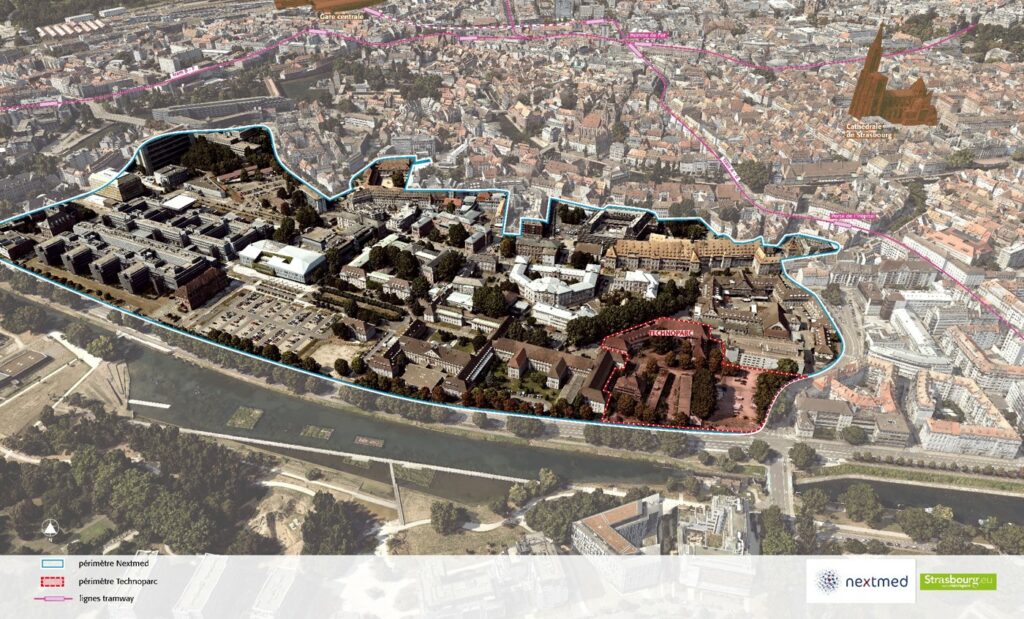
Strasbourg Innovation Park (High technology)
Established in 1983, the Strasbourg Innovation Park is a key location for research and innovation, designed to support the growth of high-tech companies.
Spanning over 170 hectares, the park provides a hub of top-tier services and infrastructure, bringing together the University, businesses, and various services. Prominent organizations based there include the International Space University (ISU), Biosynex, Novalix, Transgene, Quidel Ortho, Domain Therapeutics, and Polyplus Transfection.
Key missions of the park include:
- Providing top-tier facilities and infrastructure for businesses
- Facilitating public-private partnerships to encourage research and technology transfer
- Supporting the creation, hosting, and incubation of start-ups
- Offering personalized project support
- Providing specific financial assistance
- EASE Factory: A unique European educational site for hands-on learning of best manufacturing practices
- Bioparc: Mixed-use office/laboratory spaces dedicated to research and innovative activities, particularly in biology and chemistry
The park provides an ideal setting for innovative service activities and advanced production units.
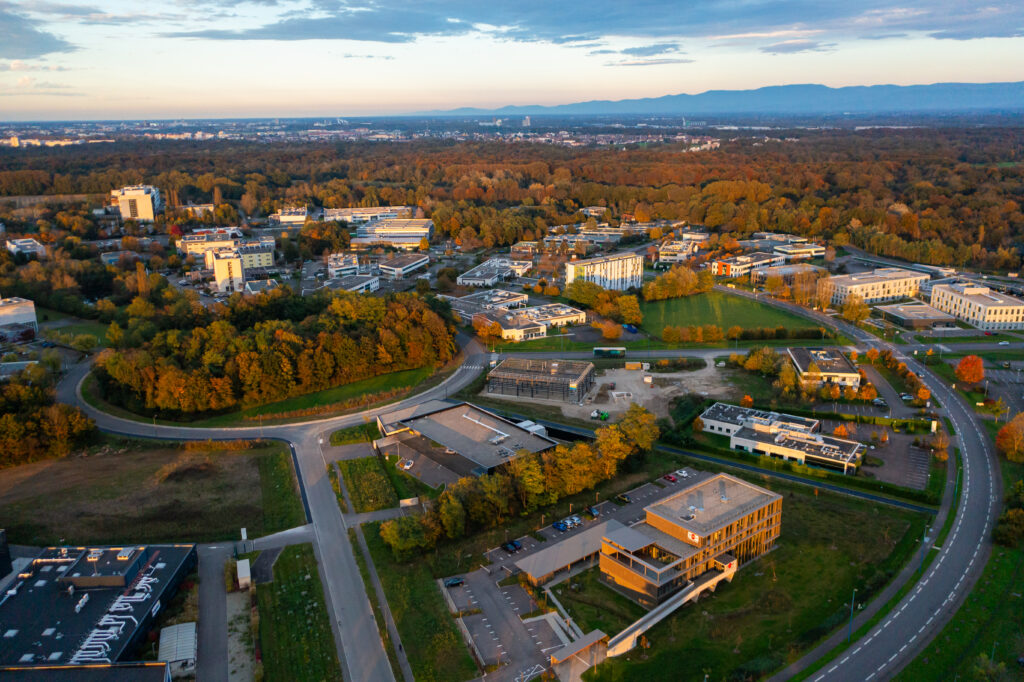
Biopôle de Colmar (Agronomy and biotech)
The Adrien Zeller Excellence Hub, also known as the Biopôle, covers 14 hectares and houses several key organizations, including the Inrae Grand Est, the French Institute of Vine and Wine (IFV), the Interprofessional Council of Alsace Wines (CIVA), the Regional Chamber of Agriculture, Rittmo Agro-environment, the University of Haute-Alsace (UHA), and the National Forests Office (ONF).
The Biopôle focuses on major themes such as agronomy, biotechnology, vine health, and wine quality.
Colmar Agglomeration has initiated a development project for the Biopôle to establish it as a prominent center for bioeconomy in the Grand Est region. This project aims to enhance the Biopôle’s expertise in living systems and address challenges related to climate change adaptation.
The development plan includes strengthening and expanding existing resources, encouraging new structures to provide complementary expertise, and enhancing service offerings. The project also emphasizes implementing renewable energy sources, developing sustainable mobility solutions, and fostering community activities.
KMØ (Digital)
Located in Mulhouse, southern Alsace, KMØ is an innovation hub focused on the digital transformation of industry and events. Spanning 11,500 square meters, KMØ unites industrialists, entrepreneurs, startups, and educational programs to collaboratively shape the future.
The hub promotes cross-fertilization, fostering new projects, addressing business needs, and helping find resources and clients. KMØ houses over 70 companies from France, Switzerland, Germany, and Belgium, along with 25 technical training programs, a fablab, an Industry 4.0 demonstrator, and an incubator.
KMØ provides businesses with modern facilities, networking opportunities, event rental spaces, and areas for relaxation and dining.
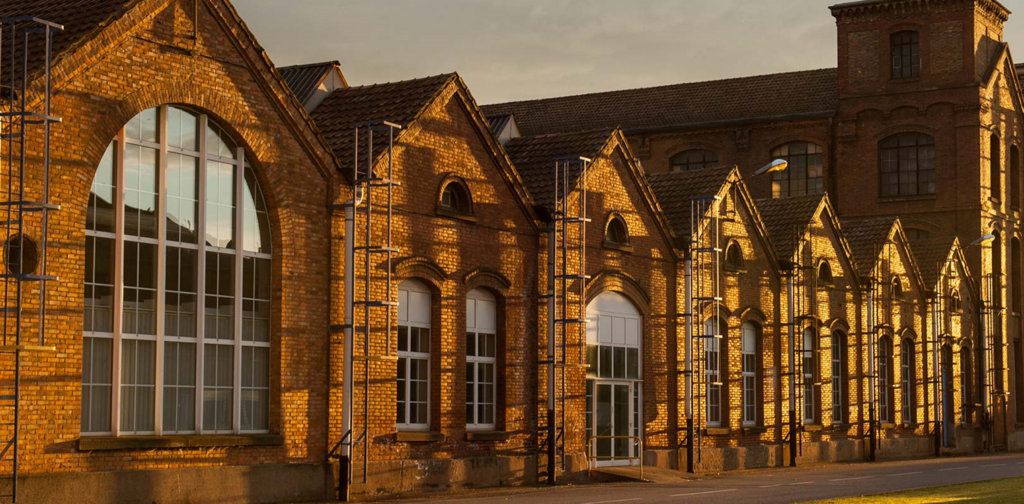
A thriving innovation ecosystem
SEMIA
SEMIA, a leading incubator in the Grand Est Region with locations in Strasbourg and Mulhouse, supports innovative project leaders across various fields, including health, digital technology, industry, deeptech, space, social economy, and culture.
SEMIA offers a tailored incubation process and assists with securing both public and private funding through its local network.
Quest for Health
Managed by the Grand Est Region, Quest for Health provides bespoke support for medtech, biotech, and e-health startups in their early stages. Experienced health entrepreneurs guide startups through the necessary steps to bring their products to market. Quest for Health, part of SEMIA, has incubated notable companies such as Spartha Medical, RDS, and Hypno VR.
In 2012, the Eurometropolis of Strasbourg launched pH8, an incubator dedicated to startups in health, new technologies, and creative industries, currently hosting over 30 companies, including Doctolib, Firalis, and Kwit.
Scal’E-nov
Scal’E-Nov, an accelerator run by the Grand Est Region, supports startup growth and connects them with essential partners and experts for development.
This list highlights key incubators, but many other support options are available for entrepreneurs in Alsace. Contact us for more information!
Corporate real estate and land
Many other real estate properties and assets are available in Alsace. If you have a project and would like to discuss it, please feel free to contact our economic development experts.